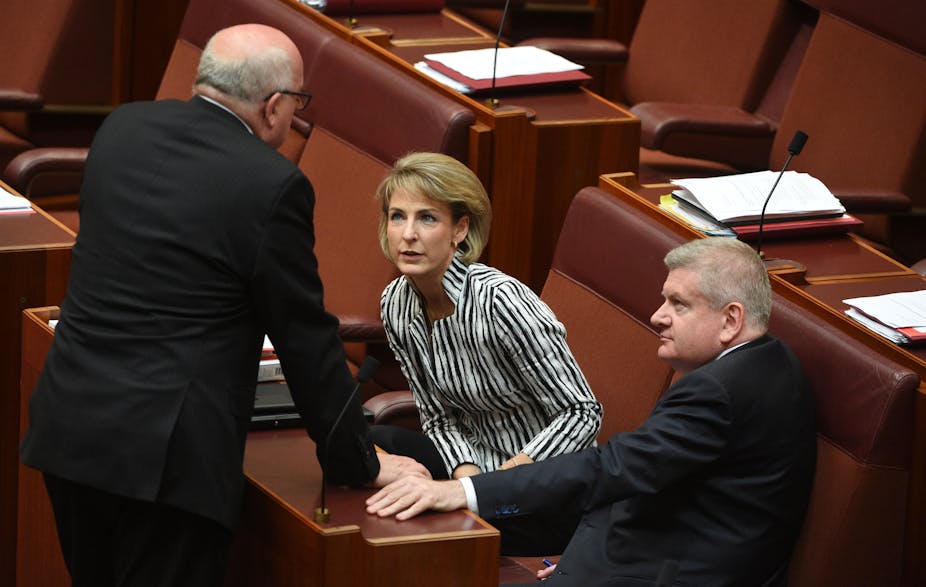Malcolm Turnbull has secured the first leg of the government’s industrial relations legislation, with the Senate voting by 33-30 in the early hours of Tuesday to toughen the governance of trade unions.
The win came after a deal with the Nick Xenophon Team (NXT) and Victorian senator Derryn Hinch for major protections for whistleblowers that the government has pledged in writing to extend later to the corporate and public sectors.
The amendments broaden the range of people who can make protected disclosures, as well as expanding remedies available to whistleblowers so they can pursue compensation, reinstatement to employment, injunctions and apologies.
The Registered Organisations Commission legislation brings the obligations and penalties faced by union officials into line with those for company directors.
The bill was one of the two triggers for the July double dissolution. The second trigger, to re-establish the Australian Building and Construction Commission, is more contentious and is still being negotiated with the crossbench. The government hopes for an agreement before parliament rises next week.
If Turnbull can come out of the session with both parts of the industrial legislation, the Coalition will end the year with some core policy runs on the board.
The registered organisations bill was opposed by Labor, the Greens and Tasmanian senator Jacqui Lambie. As well as the NXT and Hinch, One Nation and Liberal Democrat David Leyonhjelm voted with the government.
Negotiations with the crossbench also saw a strengthening of the safeguards around auditors.
The much-sought win came as Newspoll in Tuesday’s Australian showed Labor leading the Coalition 53-47% in two-party terms, unchanged in a fortnight. This is the fifth consecutive ALP lead. The Coalition’s primary vote is down a point to 38%, level with Labor’s unchanged primary vote.
Malcolm Turnbull’s net satisfaction has improved by eight points, from minus 28 to minus 20 points. Bill Shorten’s net satisfaction remains at minus 15 points. Both leaders had a one-point rise in their better prime minister figures – Turnbull leads Shorten 43-33.
Turnbull’s rating as best to handle the economy has fallen seven points from mid-May (when the question was last asked) to 48%. Shorten’s rating as best to handle the economy has risen three points to 32%.
The registered organisations bill creates a new regulator – the Registered Organisations Commission – which will have investigative powers based on those held by the Australian Securities and Investments Commission and will oversee new and extended disclosure requirements.
Penalties for officials who breach the law will be increased to bring them into line with those faced by company directors.
At present, failure to act in the best interests of the organisation carries a maximum penalty of A$10,800. This will rise to $18,000 and to $216,000 for a serious breach.
The bill introduces a criminal offence if the failure is intentionally dishonest, with a maximum penalty of $360,000 and/or five years jail, based on the Corporations Act.
Xenophon said the whistleblower protections went beyond anything seen ever before in the Commonwealth or in the states, and should be a template. He said the reform needed to be replicated into the corporation and public sector law.
Hinch said it would be one of the best – if not the best – whistleblower protection in the world.
In a written agreement the government has promised a parliamentary inquiry to examine the Registered Organisations Commission whistleblower amendments “with the objective of implementing the substance and detail of those amendments to achieve an equal or better whistleblower protection and compensation regime in the corporate and public sectors”.
The parliamentary inquiry would report by the end of June next year. If the committee’s report recommended adopting stronger whistleblower protections in the corporate and public sectors, the government would establish an expert advisory panel to expedite the development and drafting of legislation. That legislation would be introduced into parliament by December 2017.
“The government will commit to support enhancements to whistleblower protections and commit to a parliamentary vote on the legislation no later than 30 June 2018,” the agreement says.
Leyonhjelm said he had not done a deal on the legislation. “The merits of the bill were sufficient with the amendments,” he said.
Earlier Turnbull, who was overseas, had rung Leyonhjelm to say he had instructed that some contemplated Liberal Party legal action against Leyonhjelm’s party would not go ahead. Leyonhjelm said he had not even been aware of the action, which was related to the party’s logo.

